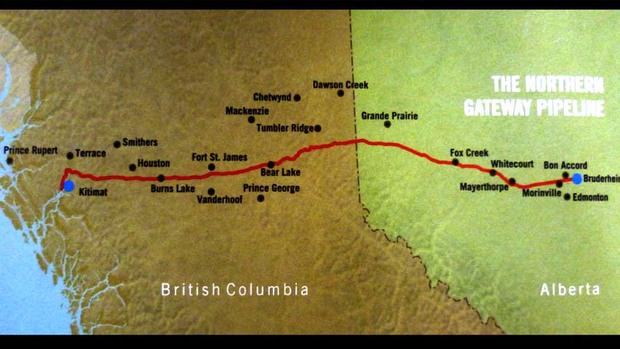On the same day the B.C. government was rejecting Northern Gateway, Alberta Premier Alison Redford was expressing hope that the powerful electoral mandate that her British Columbia counterpart just received will reset pipeline talks that have been short, rancorous and up to now unproductive.
Ms. Redford said she is confident she can deal with Christy Clark in a straight-up manner, despite a widely held view that the B.C. Premier has been playing pipeline politics for months and damaging relations between the two provinces in the process. As recently as last month, Ms. Clark said B.C. would soon be awash in riches from liquefied natural gas and consequently oil pipelines were not a priority. “We don’t need Alberta,” she said.
Asked about that remark today, Ms. Redford told The Globe and Mail in an interview that she shrugged it off when first told about it. It was uttered in the course of a provincial election campaign, she noted, when a lot of things get said for a lot of different reasons. Yet she wasn’t prepared to let her provincial counterpart off the hook completely, suggesting B.C. focus its attention on putting policies in place that will give the resource sector confidence that “you’re not going to play politics with regulatory frameworks.”
“So from my perspective the question isn’t whether or not a jurisdiction needs Alberta; the question for people in B.C. is how do they ensure that industry – whether it’s LNG, or Northern Gateway, or anything else – has confidence in a long-term regulatory framework where politics won’t be played,” Ms. Redford said. “Otherwise that just shakes investor confidence. … It’s an issue we’ve understood in Alberta and we think it’s good advice for other jurisdictions to follow.”
Ms. Redford phoned Ms. Clark the day after her shocking election win, first to congratulate her on a brilliant campaign, but also to propose a fresh set of discussions around the pipeline issue. Those talks may not happen for weeks yet, and won’t be helped by the B.C. government’s announcement on Friday that it made its final submission to the Northern Gateway Pipeline Review Panel. In it, B.C. says it could not support the project because the proponent had been unable to address the outstanding environmental concerns.
This doesn’t mean the project is dead. Just that there are huge hurdles to go.
Ms. Redford believes they can be cleared. She insists the five conditions B.C. has set out for the approval of any pipeline project can be met with goodwill and a little elbow grease. At the same time, she remains adamant that Alberta’s royalties remain off the table. If the B.C. government wants financial compensation for the environmental risk it would be assuming, it will have to come from some place other than royalties.
“It’s just a non-starter,” Ms. Redford said.
There has been some talk that Ms. Clark’s government could levy a border tax on the oil. This, in turn, has prompted some to suggest that Ms. Redford could institute a similar levy on gas originating from B.C. that is piped into Alberta. In other words, if the pipeline issue isn’t resolved in a friendly way, things could get ugly.
Has the Alberta Premier worried about such a development?
“I’m always concerned about that,” she said. “That’s why I talk about a Canadian energy strategy where I try and get people in different provinces to think about how all of this is in all of our interests and it can’t be isolated by our provincial borders. We can’t afford to play games with this. Alberta can’t. British Columbia can’t. No one else can and we’re not going to.”
On that front, the Premier said that B.C., Alberta and Saskatchewan – all energy powers – form the economic engine of the country. Which is why it’s even more important that they find ways to work together, not apart, she said.
Ms. Redford said that as someone viewing the B.C. election from the outside, it appeared Ms. Clark was given a clear mandate for economic development. The only question is what form that will take.
“Now that we’re through that [the election], we have an opportunity for a different discussion,” the Premier said. “I don’t know what that is going to look like yet but I’m pretty optimistic.”
After B.C. election, Redford hopes pipeline fight won’t get uglier




























Laissez un commentaire Votre adresse courriel ne sera pas publiée.
Veuillez vous connecter afin de laisser un commentaire.
Aucun commentaire trouvé